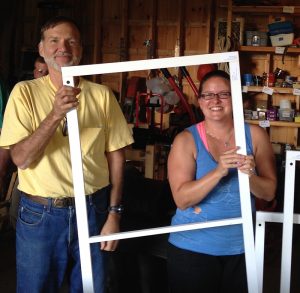Warming Mainers, One Window at a Time

Sharon Klein, an assistant professor in UMaine’s School of Economics, researches the technical, economic, environmental and social tradeoffs inherent in the production, distribution, and use of energy. But her passion lies in the development of community-based energy and efficiency projects in conjunction with her teaching undergraduate and graduate students through service learning.
One such project, done in collaboration with the Rockland, Maine-based nonprofit Window Dressers program, the Unitarian Universalist Society of Bangor, the University of Maine Office of Sustainability, and the Rotary Club of Old Town, creates inexpensive, customized window inserts that go inside existing window frames and provide an extra layer of insulation.
“I did a pilot course in the fall 2015 semester with funding help from the Mitchell Center to do this work as a student-run research project,” says Klein. She adds, “The Mitchell Center’s stakeholder-engaged, solutions-driven, interdisciplinary research approach was a perfect fit for the project.” In 2015, ten students, in collaboration with Window Dressers, built window inserts for customers in the Bangor-Orono-Old Town area. Two builds occurred in 2016, and Klein will coordinate a third window insert build in Bangor in the fall of 2017.
“It’s just such a great example of people coming together to solve an energy problem. It’s such a simple technology, you don’t pay very much for the inserts, which pay for themselves within a year or two—depending on specific circumstances—via the energy saved. And there’s the community element as well, where people are learning from each other, creating a greater sense of community, and learning a new skill. It’s win-win.”
Klein’s graduate student, Dan Mistro, who served as volunteer coordinator for builds in 2016, is currently doing his master’s thesis on the window insert program. He is calculating energy savings and environmental benefits, and surveying participants to understand the social benefits. Thus far, according to Mistro, “Our model suggests up to 27 percent energy savings in the best case setting, and a typical home is expected to save around 800 pounds of carbon dioxide emissions annually as a result to their energy savings.”
